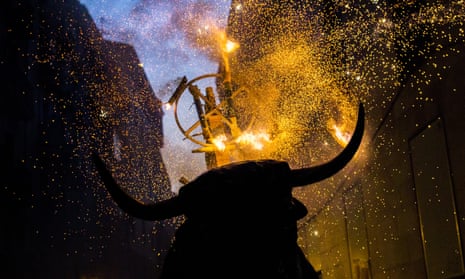Fast and goring-free were the words used to describe the final bull run of this year’s San Fermín festival in Pamplona, Spain. As the gates on their holding pen opened on Tuesday, six bulls from the renowned Miura ranch made their way through the narrow streets of the city in a record time of just over two minutes.
As the world-famous event came to a close, however, local women’s groups were using a different set of words to describe this year’s festivities, urging authorities to do more to combat a culture of sexual aggression they say has become synonymous with the festival.
This year’s festival saw hundreds of protesters gather outside Pamplona’s city hall on Monday, in response to reports of a sexual assault on a 19-year-old British woman last week. Women’s groups said she had been assaulted in a bathroom before two friends rescued her. Police are investigating the incident.
Local women’s groups have warned for years of a dark side to the festival’s nine days of alcohol-fuelled partying and bull runs, pointing to the many complaints received about sexual harassment and assaults among the crowds.
“For years, San Fermín was sold as a fiesta where anything goes, where you can do whatever you want and there are no consequences,” said Zuriñe Altable of the Platform of Women Against Sexual Violence.
Media from around the world descend annually on Pamplona to cover the daily release of six half-tonne fighting bulls along the city’s narrow streets, but scant attention has been paid to the issue of women’s safety during the event. No official figures are available, but Altable said that incidents involving gropings, insults and physical aggression against women were reported to the police during this year’s festival.
After years of downplaying the problem, city officials have begun to take action. A special police force was deployed during last year’s festival to try to prevent sexual assaults, and police now film the wine-drenched revelry known as the chupinazo to allow them to identify perpetrators. The city has also begun publishing a multilingual guide on gender-based violence and where to seek help, and an information point has been set up in the city during the festival.
The complaints emerging from this year’s festival, however, suggest that much more needs to be done, Altable said. “In some ways things are changing. With these prevention campaigns, society is aware of these problems and is taking action against these aggressions rather than tolerating them.”
On Monday evening, protesters dressed in red and white gathered outside city hall, holding up signs that read “enough already” as they urged authorities to implement further measures to address the issue. Local bars were also encouraged to join in the protest by turning off their music for half an hour after midnight.
Women’s groups questioned whether the city’s efforts were aimed at putting an end to the aggression or simply an attempt to manage the bad publicity. “The sexual aggression that takes place during the famous San Fermín festival in Pamplona isn’t something that was born yesterday,” wrote Verónica Landa on the website of the feminist group Pan y Rosas, or Bread and Roses.
Sexual aggression has become so engrained that it has even been reflected in the festival’s publicity, Landa said. Earlier this year Pamplona city hall said it would take action against an Andalusian tour company over San Fermín adverts that showed a bra dangling from a bull’s horn and a woman being fondled by a dozen men as she lifted her shirt during the celebrations.
Local authority campaigns to tackle the issue are insufficient, not to mention sexist and patriarchal, Landa said. “Most of them focus on the idea that it is up to women to prevent sexual aggression or know how to react in the face of these acts.”
As the San Fermín festival came to an end on Tuesday, the mayor of Pamplona, Joseba Asirón, said this year’s event had been wonderful, with the exception of the sexual attacks. “We’ll never tire of saying that these are intolerable, and that right now they are a black stain on San Fermín.” The newly elected mayor said the city now had a year to tackle the issue and promised next year’s festival would be different.
There were no serious injuries in the final run of San Fermín in Pamplona, but the town of Pedreguer, near Alicante in eastern Spain, was in mourning on Tuesday after a French tourist was gored to death at its local fiesta. Media reports said the 44-year-old had had been engrossed in recording the festivities, in which bulls charge through the street chasing locals and tourists, on his mobile when he was gored twice.
Pedreguer authorities said the fiesta’s remaining events featuring bulls would be cancelled and reminded those taking part in the events to “do so responsibly and in accordance with safety standards”.

Comments (…)
Sign in or create your Guardian account to join the discussion